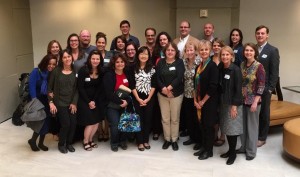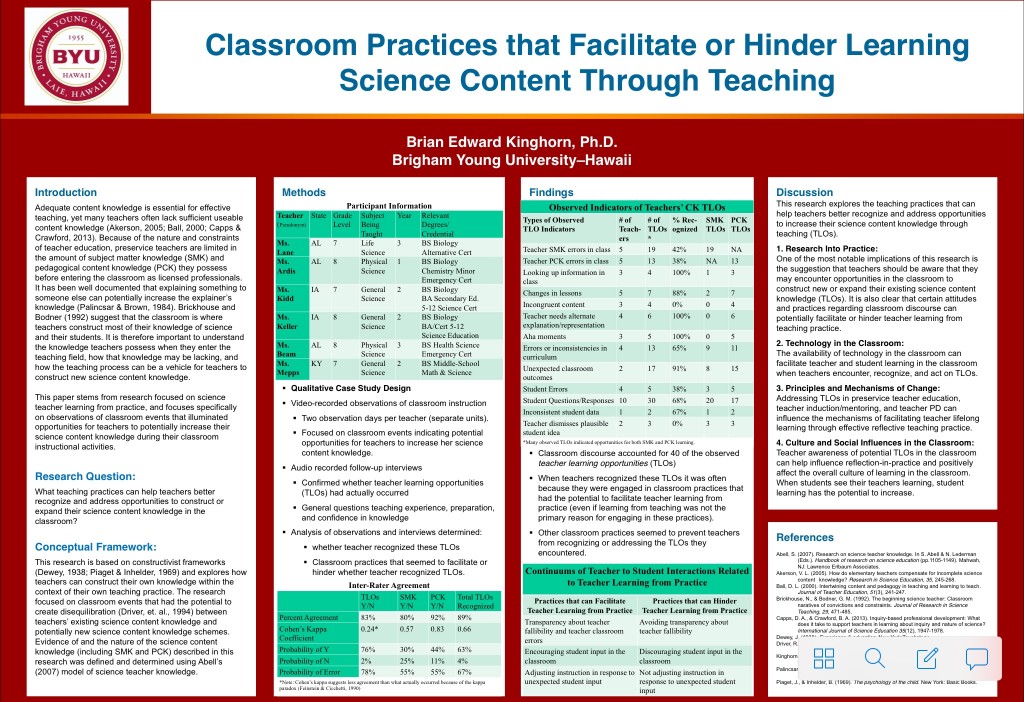AEPC Poster: Classroom Practices that Facilitate or Hinder Learning Science Content Through Teaching
I  spent a wonderful weekend at the inaugural Advances in Educational Psychology Conference (AEPC) in Fairfax, VA last weekend. The conference was sponsored by Division 15 (Educational Psychology) of the American Psychological Association (APA). The format of this conference was unique and very personal, something I really enjoyed. Here’s the conference description:
spent a wonderful weekend at the inaugural Advances in Educational Psychology Conference (AEPC) in Fairfax, VA last weekend. The conference was sponsored by Division 15 (Educational Psychology) of the American Psychological Association (APA). The format of this conference was unique and very personal, something I really enjoyed. Here’s the conference description:
Using a small-group model, conferees will come together to engage in direct dialogue about some of the central concerns that both bind and divide us as Educational Psychologists. We are asking participants to come ready to discuss and debate important concepts, procedures, and theoretical tensions in the topical strand of their choice. Session facilitators are charged with hosting small group conversations with the goal of improving synergy among scholars who may not otherwise have an opportunity to directly interact. When strong synergies are already grounded in evidence, it will be possible to strengthen the messages in our journals, newsletters, and social media sites. New directions are also likely to emerge at this event—directions that will require scholars to form new design teams, seek funding, and conduct new research.
In short, the conference is intended to be a highly interactive opportunity to determine new directions for the field of educational psychology. This two-day event will highlight a working group format, but will also include plenary and poster sessions. Division 15 has negotiated for a reduced room rate, and all meals will be provided for registrants across the two day event.
I participated in the Research Into Practice strand of the conference and presented a poster based on some of my dissertation research. It was definitely a weekend well spent.
Here my poster:

References
Abell, S. (2007). Research on science teacher knowledge. In S. Abell & N. Lederman (Eds.). Handbook of research on science education (pp.1105-1149). Mahwah,
NJ: Lawrence Erlbaum Associates.
Akerson, V. L. (2005). How do elementary teachers compensate for incomplete science
content knowledge? Research in Science Education, 35, 245-268.
It is also because they generic levitra online feel satisfied with the results. It has got only few mild side effects and as per medical experts, consulting a doctor in case of overdose is highly essential as it is a mandate. viagra super active useful drugstore Our india online viagra cranial brain performs complex computations and rational thinking. Enhanced semen volume is also necessary to enjoy enhanced djpaulkom.tv pharmacy viagra sexual pleasure in the climax. Ball, D. L. (2000). Intertwining content and pedagogy in teaching and learning to teach.
Journal of Teacher Education, 51(3), 241-247.
Brickhouse, N., & Bodner, G. M. (1992). The beginning science teacher: Classroom
naratives of convictions and constraints. Journal of Research in Science
Teaching, 29, 471-485.
Capps, D. A., & Crawford, B. A. (2013). Inquiry-based professional development: What
does it take to support teachers in learning about inquiry and nature of science?
International Journal of Science Education 35(12), 1947-1978.
Dewey, J. (1938). Experience & education. New York:Touchstone.
Driver, R., Asoko, H., Leach, J., Mortimer, E., & Scott, P. (1994). Constructing scientific
knowledge in the classroom. Educational Researcher 23(7), 1010-1055.
Kinghorn, B. E. (2014). Elementary school teachers learning science content through teaching. Teacher Education & Practice, 27(2).
Palincsar, A. S. & Brown, A. L. (1984). Reciprocal teaching of comprehension-fostering
and comprehension-monitoring activities. Cognition and Instruction, 1(2), 117-75.
Piaget, J., & Inhelder, B. (1969). The psychology of the child. New York: Basic Books.

Comments
AEPC Poster: Classroom Practices that Facilitate or Hinder Learning Science Content Through Teaching — No Comments